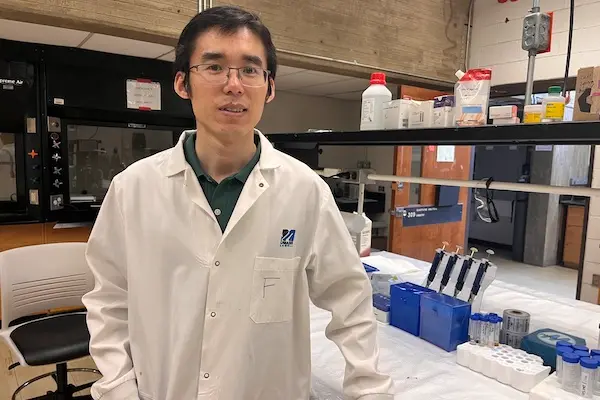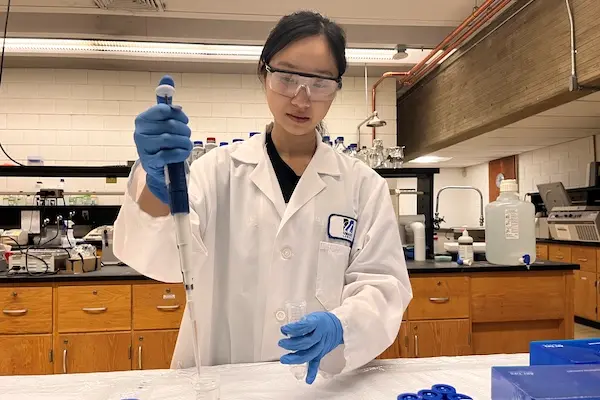Antibiotics and Anti-Inflammatory Drugs Are Combined in a Single Nanoparticle

07/29/2024
By Karen Angelo
A fast-moving, life-threatening condition, sepsis is the body’s extreme response to an infection. Each year, at least 350,000 adults who develop sepsis die during hospitalization or are discharged to hospice, according to the Centers for Disease Control and Prevention. Most drugs used to treat sepsis have failed to improve mortality rates.
In a new study funded by a university seed grant, Asst. Prof. Fanfei Meng of the Biomedical and Nutritional Sciences Department is evaluating the effectiveness of combining antibiotics and anti-inflammatory drugs in a nanoparticle. The nanoparticle could deliver the drugs to the bloodstream simultaneously to kill bacteria and block the activation of inflammation.
“The current treatment of antibiotics kills the bacteria but cannot block inflammation, and patients may experience severe side effects due to the high dosage of drugs needed to combat sepsis,” says Meng, who is leading the research in partnership with Assoc. Prof. Soumita Das, also of the Biomedical and Nutritional Sciences Department. “In our study, we are leveraging nanotechnology to deliver two drugs together that will limit toxicity, to give patients the best chance of fighting sepsis.”
Common illnesses that lead to sepsis include pneumonia and urinary tract, skin and gut infections. When the body’s immune system sends infection-fighting signals throughout the body rather than just to the infection, sepsis develops. It can cause organ and tissue failure.

“UMass Lowell is renowned as one of the best public universities in Massachusetts known for its pharmaceutical research, and with Dr. Meng’s mentorship, I am gaining valuable knowledge and support for my research,” says Nguyen, who has been designing and conducting experiments to modulate the immune system by using nanotechnology for treating sepsis and other diseases, including cancer.
The field of nanomedicine has been growing rapidly, opening the door to advances in therapeutics, vaccines, bioimaging and diagnostics. By using nanotechnology to deliver the medications, the research team is aiming to control the release rate and systematic delivery of the drugs to eliminate bacteria, neutralize endotoxins and inhibit inflammation.
“There has been a lack of specific drugs for severe sepsis treatment in the clinic. The success of the proposed research has the potential to generate a new medicine dedicated to addressing this critical medical need in sepsis treatment,” says Meng.
